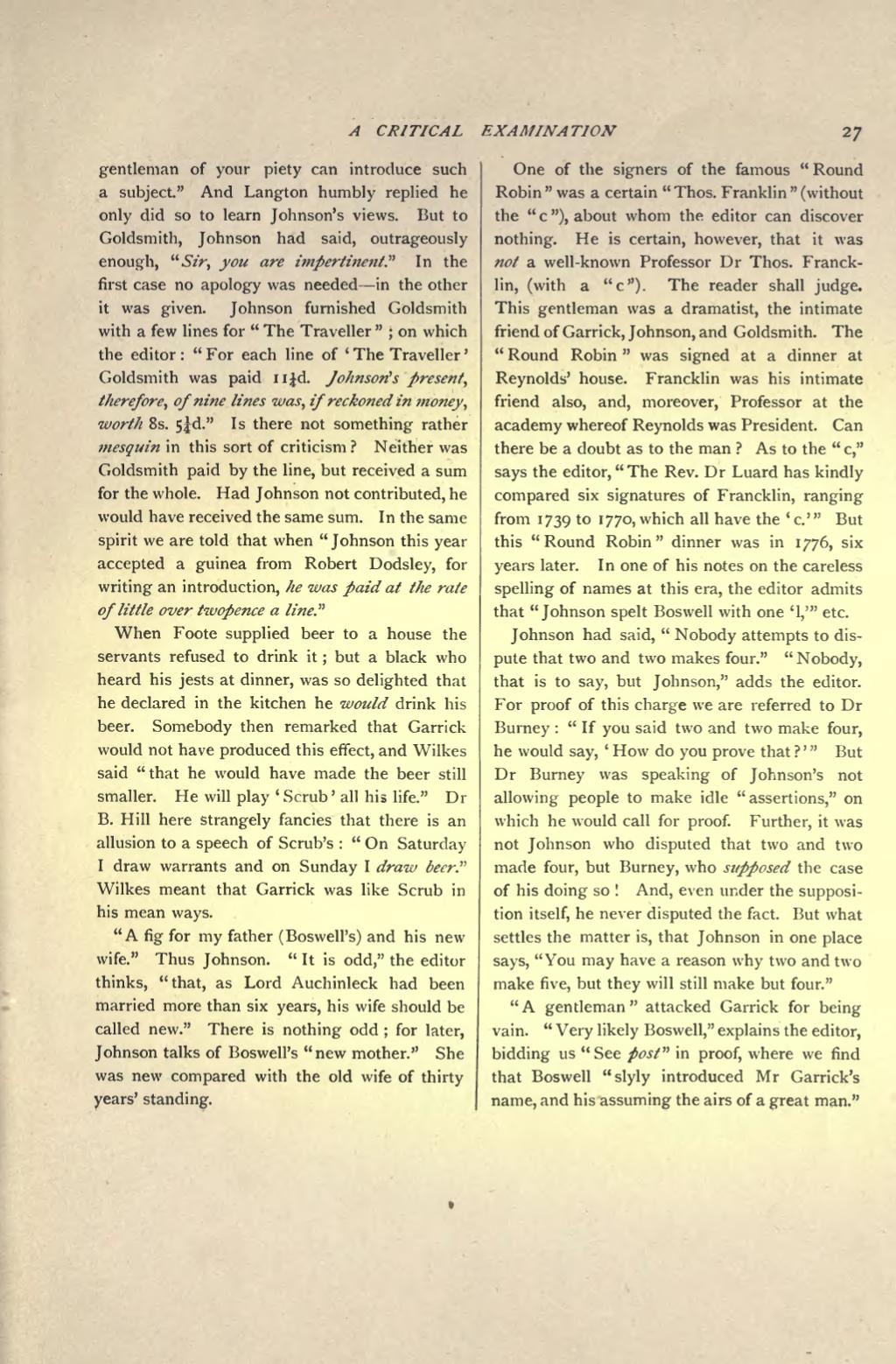gentleman of your piety can introduce such a subject." And Langton humbly replied he only did so to learn Johnson's views. But to Goldsmith, Johnson had said, outrageously enough, "Sir, you are impertinent" In the first case no apology was needed—in the other it was given. Johnson furnished Goldsmith with a few lines for "The Traveller"; on which the editor: "For each line of 'The Traveller' Goldsmith was paid 11¼d. Johnson's present, therefore, of nine lines was, if reckoned in money, worth 8s. 5¼d." Is there not something rather mesquin in this sort of criticism? Neither was Goldsmith paid by the line, but received a sum for the whole. Had Johnson not contributed, he would have received the same sum. In the same spirit we are told that when " Johnson this year accepted a guinea from Robert Dodsley, for writing an introduction, he was paid at the rate of little over twopence a line"
When Foote supplied beer to a house the servants refused to drink it; but a black who heard his jests at dinner, was so delighted that he declared in the kitchen he would drink his beer. Somebody then remarked that Garrick would not have produced this effect, and Wilkes said "that he would have made the beer still smaller. He will play 'Scrub' all his life." Dr B. Hill here strangely fancies that there is an allusion to a speech of Scrub's: "On Saturday I draw warrants and on Sunday I draw beer" Wilkes meant that Garrick was like Scrub in his mean ways.
"A fig for my father (Boswell's) and his new wife." Thus Johnson. "It is odd," the editor thinks, "that, as Lord Auchinleck had been married more than six years, his wife should be called new." There is nothing odd; for later, Johnson talks of Boswell's "new mother." She was new compared with the old wife of thirty years' standing.
One of the signers of the famous "Round Robin" was a certain "Thos. Franklin" (without the "c"), about whom the editor can discover nothing. He is certain, however, that it was not a well-known Professor Dr Thos. Francklin, (with a "c"). The reader shall judge. This gentleman was a dramatist, the intimate friend of Garrick, Johnson, and Goldsmith. The "Round Robin" was signed at a dinner at Reynolds' house. Francklin was his intimate friend also, and, moreover, Professor at the academy whereof Reynolds was President. Can there be a doubt as to the man? As to the "c," says the editor, "The Rev. Dr Luard has kindly compared six signatures of Francklin, ranging from 1739 to 1770, which all have the 'c.'" But this "Round Robin" dinner was in 1776, six years later. In one of his notes on the careless spelling of names at this era, the editor admits that "Johnson spelt Boswell with one 'l,'" etc.
Johnson had said, "Nobody attempts to dispute that two and two makes four." "Nobody, that is to say, but Johnson," adds the editor. For proof of this charge we are referred to Dr Burney: "If you said two and two make four, he would say, 'How do you prove that?'" But Dr Burney was speaking of Johnson's not allowing people to make idle "assertions," on which he would call for proof. Further, it was not Johnson who disputed that two and two made four, but Burney, who supposed the case of his doing so! And, even under the supposition itself, he never disputed the fact. But what settles the matter is, that Johnson in one place says, "You may have a reason why two and two make five, but they will still make but four."
"A gentleman" attacked Garrick for being vain. "Very likely Boswell," explains the editor, bidding us "See post" in proof, where we find that Boswell "slyly introduced Mr Garrick's name, and his assuming the airs of a great man."
